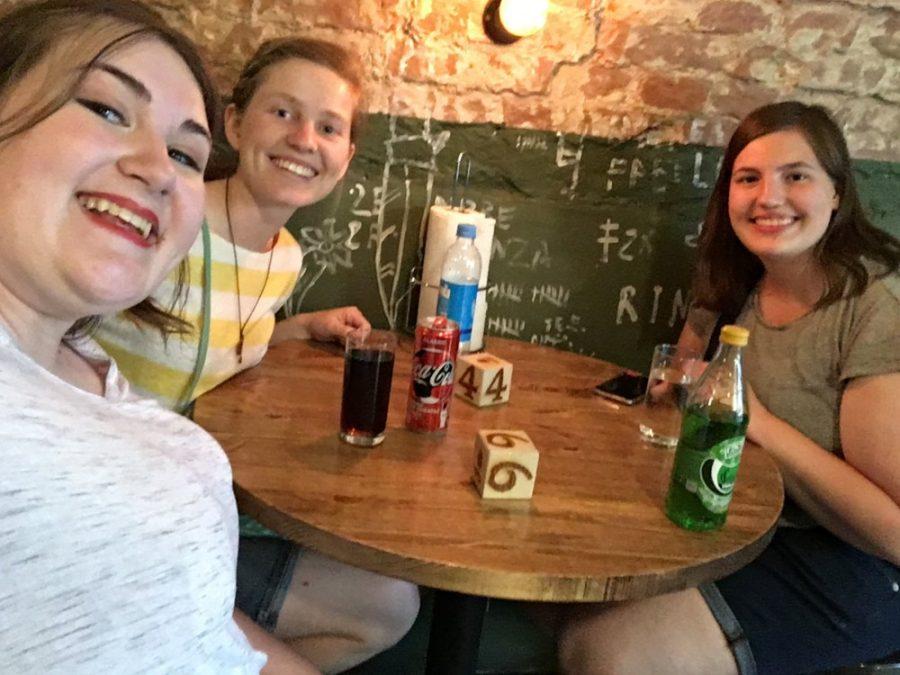Hello from Mother Russia! I’m spending my summer in Moscow on a University of Arizona study abroad program and will be giving you all updates — kind of like a travel blog, but worse (or better?), because it’s less bloggy.
Moscow is consistently beautiful throughout and I’ve already had the chance to see St. Basil’s Cathedral, the Kremlin and Red Square. However, my favorite things so far have been trying to accomplish daily life tasks trapped behind the language and culture barrier.
When I signed the papers to come to Russia, I had about ten poorly pronounced Russian words under my belt. When I landed, I had scarcely any more. Yet, I felt like I had to be here. I’m a first-generation Russian-Bulgarian American and I don’t know either of my native languages.
RELATED: President Robbins saves the day
Apparently, if a child stops speaking his or her native language before the age of nine, the brain actually purges the information. According to a French study, these people have little advantage over a first-time non-native speaker in learning their native language.
When I was younger, I didn’t really care that I didn’t know any Russian. However, it began to bother me that I couldn’t communicate verbally with anybody in my biological family other than my mother and brother. When my babushka visited the United States, I didn’t even know how to thank her for the delicious foods she made for me.
I am visiting Moscow through the Russian Language Program offered by UA. I came in with quite unrealistic expectations. I thought if I worked really hard, I would be able to speak decently well after two months.
I got stuck in a little crisis when I realized everyone else was right: The Russian language is hard. So hard, I’m not sure it’s even meant to be learned as a foreign language. For example, did you know that there are no rules for stresses on words? A language learner almost has to hear every word to learn how it sounds, and then memorize the stress. If the stress is wrong, the word might not even make sense.
And oh, the torment I must endure when I see three-year-old kids who have a better command of the language than I probably ever will. Basically, I got hit with one of the biggest reality checks of my life in this first week.
RELATED: Language event highlights communication barriers
After that week, I realized that I needed to lower my expectations of myself and find the small successes I have every day. I can learn from every mistake and laugh about them later. It’s the small interactions that teach me the most to overcome this barrier.
My first time at a grocery store was an adventure. I had to flip through my dictionary to find out which of the rectangular packages was butter. I threw a yogurt in my basket without consulting my dictionary and I ended up with strawberry flavored cottage cheese. Though I was not disappointed, I really annoyed the check-out lady.

After several repetitions, I figured out she asked me if I wanted a bag. I said ‘yes,’ but I didn’t know I was supposed to bag my own food until she started throwing someone else’s purchases on top of mine. I frantically sorted through the groceries, shoving mine in my bag. I also learned I was supposed to take my basket after she threw it at me. That’s okay. That’s what learning is all about.
My mom warned me several times not to look too touristy or I’ll be conned. Thankfully, that’s only happened once so far, and it was quite benign. A cute older woman at a fruit market offered me the most delicious looking strawberry I’ve ever seen.
Of course, I was going to sample it. She asked me a question, which I ignorantly assumed was ‘is it good?,’ so I responded affirmatively. I actually agreed to buy the largest box of strawberries I’ve ever seen. I asked ‘how much’ and every time I needed her to repeat it, she raised the price (which I only realized later). I ended up paying almost double the regular price. I hadn’t even stepped into the market yet. I went wrong on so many levels — I can’t even blame the woman.

Apparently, when I don’t open my mouth, I do look Russian. And therefore, Russians continually make the mistake of asking me for directions or striking up a conversation with me. And, oh, how I wish I could respond.
I usually have to say, in Russian, “I can’t speak Russian.” Interestingly, many don’t believe me and continue to talk to me. Despite the many awkward endings, three times out of thirteen, or so, I’ve had moderate success. I held a place in line for one woman, I told another she was not approaching an exit, and I told another I wasn’t getting off the metro. I’ll take that record for my first week.
Here in Russia, I feel more American than I ever have in my life — but I am filled with motivation to improve my abilities and improve my small interactions. We’ll see how this goes!
Follow The Daily Wildcat on Twitter









